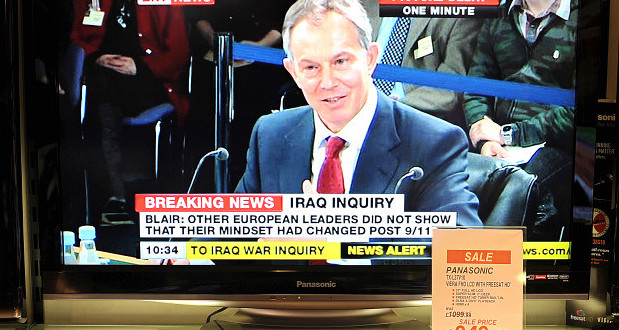Former UK Prime Minister Tony Blair recently testified that concerns about Israel and Israeli officials were a major part of his discussions with Bush in 2002. BEN STANSALL/AFP/Getty Images
Numerous Israeli leaders and pro-Israel lobby groups pushed for the U.S. invasion of Iraq, a fact that some have tried to obscure…
Given all the problems that the lobby’s prescriptions have produced in recent years, you’d think U.S. leaders would have learned to ignore its advice. But there’s little sign of that so far, which means that these past errors are likely to be repeated. Don’t say I didn’t warn you.
By Stephen M. Walt, reposted from Foreign Policy
Probably the most controversial claim in my work with John Mearsheimer on the Israel lobby is our argument that it played a key role in the decision to invade Iraq in 2003.
Even some readers who were generally sympathetic to our overall position found that claim hard to accept, and some left-wing critics accused us of letting Bush and Cheney off the hook or of ignoring the importance of other interests, especially oil. Of course, Israel’s defenders in the lobby took issue even more strenuously, usually by mischaracterizing our arguments and ignoring most (if not all) of the evidence we presented.
So I hope readers will forgive me if I indulge today in a bit of self-promotion, or more precisely, self-defense. This week, yet another piece of evidence surfaced that suggests we were right all along (HT to Mehdi Hasan at the New Statesman and J. Glatzer at Mondoweiss).
In his testimony to the Iraq war commission in the U.K., former Prime Minister Tony Blair offered the following account of his discussions with Bush in Crawford, Texas in April 2002. Blair reveals that concerns about Israel were part of the equation and that Israel officials were involved in those discussions.
Take it away, Tony:
As I recall that discussion, it was less to do with specifics about what we were going to do on Iraq or, indeed, the Middle East, because the Israel issue was a big, big issue at the time. I think, in fact, I remember, actually, there may have been conversations that we had even with Israelis, the two of us, whilst we were there. So that was a major part of all this.”
Notice that Blair is not saying that Israel dreamed up the idea of attacking Iraq or that Bush was bent on war solely to benefit Israel or even to appease the Israel lobby here at home. But Blair is acknowledging that concerns about Israel were part of the equation, and that the Israeli government was being actively consulted in the planning for the war.
Support for Israel is a key tenet of neoconservatism
Blair’s comments fit neatly with the argument we make about the lobby and Iraq. Specifically, Professor Mearsheimer and I made it clear in our article and especially in our book that the idea of invading Iraq originated in the United States with the neoconservatives, and not with the Israeli government. But as the neoconservative pundit Max Boot once put it, steadfast support for Israel is “a key tenet of neoconservatism.” Prominent neo-conservatives occupied important positions in the Bush administration, and in the aftermath of 9/11, they played a major role in persuading Bush and Cheney to back a war against Iraq, which they had been advocating since the late 1990s.
Iraq the first step in a broader campaign of “regional transformation” that would eventually include Iran.
We also pointed out that Prime Minister Ariel Sharon and other Israeli officials were initially skeptical of this scheme, because they wanted the U.S. to focus on Iran, not Iraq. However, they became enthusiastic supporters of the idea of invading Iraq once the Bush administration made it clear to them that Iraq was just the first step in a broader campaign of “regional transformation” that would eventually include Iran.
At that point top Israeli leaders from across the political spectrum became cheerleaders for the invasion, and they played a prominent role in helping to sell the war here in the United States.
Benjamin Netanyahu visited Washington, DC in April 2002 and spoke in the U.S. Senate, telling his audience “the urgent need to topple Saddam is paramount,” and that the campaign “deserves the unconditional support of all sane governments.” (It sure sounds like he was well aware of the discussions in Crawford, doesn’t it?)
In May, foreign minister Shimon Peres said on CNN that “Saddam Hussein is as dangerous as bin Laden,” and that the United States “cannot sit and wait.”
A month later, former Prime Minister Ehud Barak wrote an op-ed in the Washington Post recommending that the Bush administration “should, first of all, focus on Iraq and the removal of Saddam Hussein.”
This chorus continued through the summer and fall, with Barak and Netanyahu writing additional op-eds in the New York Times and Wall Street Journal, each calling for military action to topple Saddam.
Netanyahu’s piece was titled “The Case for Toppling Saddam” and said that “nothing less than dismantling his regime will do.”
Prime Minister Ariel Sharon’s official spokesman, Ra’anan Gissen, offered similar statements during this period as well, and Sharon himself told the Knesset Foreign Affairs and Defence Committee in August 2002 that Iraq was “the greatest danger facing Israel.”
According to an Aug. 16 article by Aluf Benn in Ha’aretz, Sharon reportedly told the Bush administration that putting off an attack would “only give [Saddam] more of an opportunity to accelerate his program of WMD.”
Foreign Minister Peres reiterated his own warnings as well, and told reporters in September 2002 that “the campaign against Saddam Hussein is a must.” (For sources, see pp. 233-38).
If that’s not enough evidence of where Israel’s leaders were in the run-up to the war, consider that former President Bill Clinton told an audience at an Aspen Institute meeting in 2006 that “every Israeli politician I knew” (and he knows a lot of them) believed that Saddam Hussein was so great a threat that he should be removed even if he did not have WMD.
Nor is this testimony at all surprising, given that we are talking about the leader who had fired Scud missiles into Israel during the first Gulf War in 1991 and had been giving money to the families of suicide bombers. If the Bush administration was bent on taking him out and then turning its gun-sights on Syria and Iran, one can easily understand why Israelis would welcome it.
Israel lobby groups sell the war
Now, what about key groups in the lobby itself?
If the neoconservatives deserve the blame for dreaming up the idea of invading Iraq, key groups and individuals in the lobby played an important role in selling it on Capitol Hill and to the public at large.
AIPAC head Howard Kohr told the New York Sun in January 2003 that one of the organization’s “success stories” over the previous year was “quietly lobbying Congress” to approve the resolution authorizing the use of force, a fact confirmed by journalists such as Nathan Guttman of the Forward, Michelle Goldberg of Salon.com, John B. Judis of the New Republic, and even Jeffrey Goldberg in The New Yorker (see p. 242).
Pundits at pro-Israel think tanks like the Brookings Institutions’s Saban Center were openly backing war by the fall of 2002, with Martin Indyk, the head of the center, and Kenneth Pollack, its director of research, playing especially prominent roles.
Moreover, in this same period both the Jewish Council on Public Affairs and the Conference of Presidents of Major American Jewish Organizations voted to endorse the use of force “as a last resort.”
Mortimer Zuckerman, a well-connected businessman and publisher who was then the chairman of the Conference of Presidents, was especially convinced about the futility of U.N. inspections and the need to topple Saddam, and wrote several editorials making that case in his magazine (U.S. News and World Report).
Still skeptical? Consider the following passage from an article by Matthew Berger of the Jewish Telegraph Agency, published just after President Bush’s September 2002 appearance at the United Nations, where he threatened military action if Iraq did not comply with U.N. resolutions:
Despite their caution and without specifying a formal policy, Jewish leaders predominantly expressed support for Bush’s words at the United Nations.
They said he detailed a strong case that Saddam has consistently ignored U.N. resolutions, that he was seeking to obtain weapons of mass destruction and that Saddam has shown a propensity towards using them.
“Iraq is the single most important threat right now to world peace and to our safety,” said Dr. Mandell Ganchrow, executive vice president of the Orthodox Religious Zionists of America. He described Saddam as a “maniac” who “has proven that he will gas his own people.”
“The fanaticism that exists throughout the Middle East is best addressed by first dealing with Iraq,” agreed Rabbi Eric Yoffie, president of the Reform movement’s Union of American Hebrew Congregations.
Many American Jewish leaders expressed the fear that Saddam has not been quiet for the past decade because of a loss of will, but because he has been using the time to garner weapons for an eventual attack on U.S. interests and allies.
“Do we have to wait until a target is hit, and the world says, ‘Ah, yes, he did have weapons of mass destruction,’” asked David Harris, executive director of the American Jewish Committee.”
Not to be outdone, the editor of Jewish Week, Gary Rosenblatt, wrote an editorial in mid-December 2002 saying that “Washington’s imminent war on Saddam Hussein is . . . an opportunity to rid the world of a dangerous tyrant who present a particularly horrific threat Israel.”
He went on to say “the Torah instructs that when you enemy seeks to kill you kill him first. Self-defense is not permitted; it is commanded.”
Even the relatively liberal Rabbi David Saperstein of the Union of Reform Judaism’s Religious Action Center told journalist Michelle Goldberg that “the Jewish community would want to see a forceful resolution to the threat that Saddam Hussein poses.” “Forceful resolution” means war, and Saperstein also offered comparisons to the Bosnian conflict and the Nazi era to reinforce his call for military action.
Finally, consider the following passage from an editorial in the Jewish newspaper Forward, published in 2004:
As President Bush attempted to sell the war .. in Iraq, America’s most important Jewish organizations rallied as one to his defense. In statement after statement community leaders stressed the need to rid the world of Saddam Hussein and his weapons of mass destruction. Some groups went even further, arguing that that the removal of the Iraqi leaders would represent a significant step toward bringing peace to the Middle East and winning America’s war on terrorism”
The editorial also noted that “concern for Israel’s safety rightfully factored into the deliberations of the main Jewish groups.”
The Forward, it is worth noting, is well-connected and has a well-deserved reputation for probity in its reporting on the American Jewish community. It is hard to see how its editors could be mistaken about such an important issue or why they would lie about it. And they never issued a retraction.
We can therefore assume that the writers of this editorial knew what they were talking about: key groups in the lobby supported the war. Reasonable people can disagree about how important their influence was, of course, but at a minimum these groups reinforced the Bush administration’s resolve and made it less likely that other politicians or commentators would conduct a serious debate about the wisdom of the invasion.
Finally, it bears reiterating that I am talking about key groups and individuals in the Israel lobby, and not about the American Jewish community in toto.
Indeed, my co-author and I have repeatedly pointed to surveys showing that American Jews were less supportive of the decision to invade Iraq than the American population as a whole, and we have emphasized that it would be a cardinal error (as well as dangerous) to try to “blame the Jews” for the war.
Rather, blame should be reserved for Bush and Cheney (who made the ultimate decision for war), for the neoconservatives who dreamed up this foolish idea, and for the various groups and individuals — including those in the lobby — who helped sell it.
Nor am I suggesting that these individuals advocated this course because they thought it would be good for Israel but bad for the United States. Rather, they unwisely believed it would be good for both countries. And as we all know, they were tragically wrong.
That misconception helps us understand why the Israelis and their American friends who promoted the Iraq war didn’t do a better job of covering their tracks and obscuring their enthusiasm for the endeavor. I suspect it is because they genuinely believed that the war would be easy and would bring great benefits for both Israel and the United States.
If the war was a smashing success, then they would reap the credit and no one would spend that much time probing the war’s origins. And even if someone did, its proponents would be hailed as strategic geniuses who had conceived and planned a stunning victory.
Once the war went south, however, and numerous people began to probe how this disaster came about, an extensive dust-kicking operation to veil the role of Israel and the lobby was set in motion.
This campaign won’t work, however, because too many people already know that Israel and the lobby were cheerleaders for the war and with the passage of time, more and more evidence of their influence on the decision for war will leak out.
The situation is analogous to what happened with the events surrounding the infamous Gulf of Tonkin Resolution in August 1964. The Johnson administration could dissemble and cover its tracks for a few years, but eventually the real story got out, as will happen with Iraq. Indeed, Blair’s testimony is evidence of that process at work.
For sure, many Israelis and their friends in the United States will continue to maintain that the Sharon government actually tried to stop the march to war and that groups in the lobby – including AIPAC — stayed on the sideline and did not push for war.
But these post hoc fairy tales will be increasingly hard to sell to the American people, not only because there is a growing body of evidence which directly contradicts them (see pp. 261-262) , but also because the internet and the blogosphere is allowing the word to spread. Thankfully, we no longer have to rely on the mainstream media to get the story straight.
The war has been a disaster
Finally, let’s not forget that while the Iraq war has been a disaster for the United States, it has also been very bad for Israel, not just because its principal patron has been stuck in a quagmire in Iraq, but also because the biggest winner from the war was Iran, which is the country that Israel fears most.
All of this shows that despite the lobby’s openly-stated commitment to promoting policies that it thinks will benefit Israel, it did not work out that way with the Iraq war. Nor is it working out that way with its unyielding support of Israel’s self-destructive drive to colonize the Occupied Territories, a process that is turning Israel into an apartheid state. And the same warning applies to its efforts to keep all options-including the use of force — “on the table” vis-à-vis Iran.
Given all the problems that the lobby’s prescriptions have produced in recent years, you’d think U.S. leaders would have learned to ignore its advice. But there’s little sign of that so far, which means that these past errors are likely to be repeated. Don’t say I didn’t warn you.
Stephen M. Walt is the Robert and Renée Belfer professor of international relations at Harvard University.
RELATED READING:
Pro-Israel neocons abound in Washington, and they’re calling the shots
Trita Parsi: On Iran, Is It Trump Versus His Own Neocons?
The pro-Israel billionaires & neocons behind Marco Rubio
Former intelligence officials: US drone attack on Iran motivated by Israel
Questionable Israeli intelligence sparks dangerous crisis with Iran
Congress passes legislation to expend $19 million/day on behalf of Israel
The Staggering Cost of Israel to Americans: The Facts
Correcting some statements by Max Blumenthal





